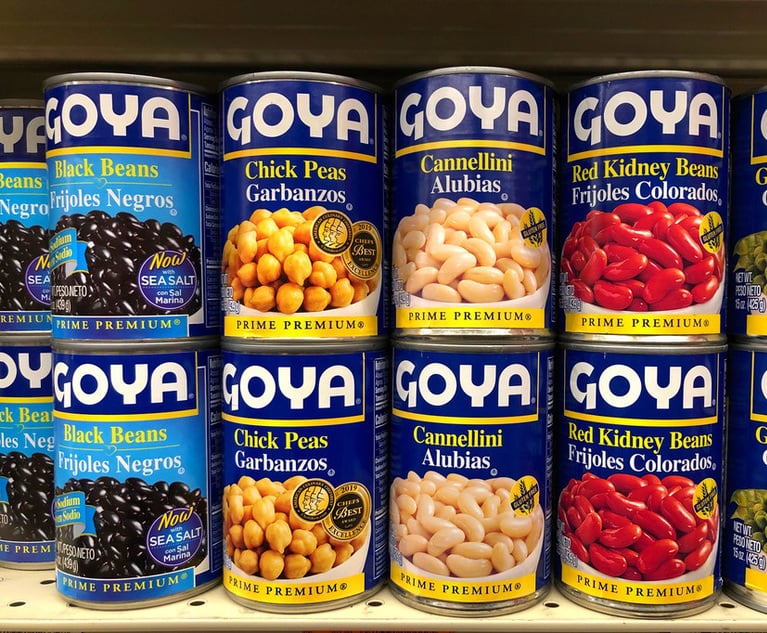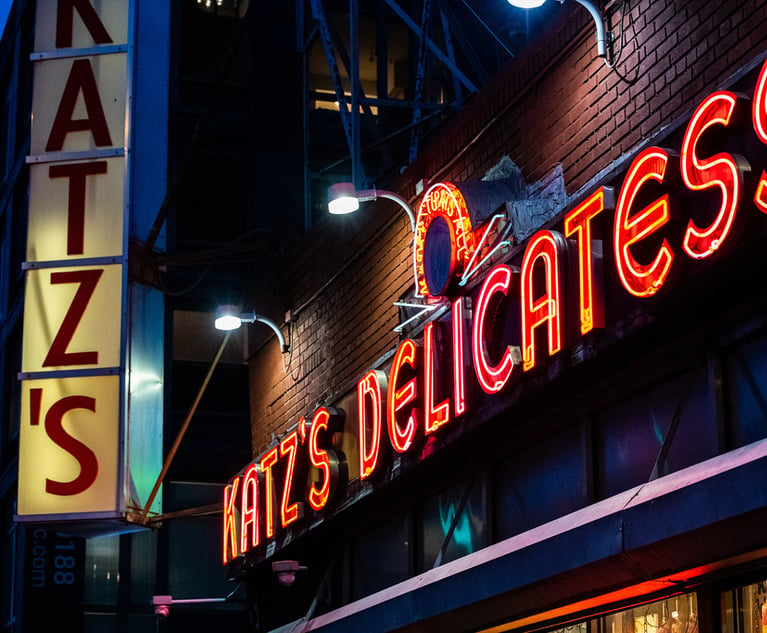Court Blocks San Francisco's Push to Put Warning Labels on Ads for Sugary Drinks
An en banc panel of the U.S. Court of Appeals for the Ninth Circuit blocked a San Francisco city ordinance that would have required health warnings on advertisements for sodas and other sugar-sweetened drinks.
January 31, 2019 at 05:00 PM
4 minute read
The original version of this story was published on The Recorder

A federal appellate court has blocked a San Francisco city ordinance that would have required health warnings on advertisements for sodas and other sugar-sweetened drinks.
An en banc panel of the U.S. Court of Appeals for the Ninth Circuit on Thursday found that the city's law compelled commercial speech and violated the First Amendment rights of the plaintiffs in the case, American Beverage Association, California Retailers Association, and California State Outdoor Advertising Association, who were represented by Latham & Watkins.
The San Francisco ordinance, enacted in June 2015, would have required certain advertising materials and billboards for drinks that included more than 25 calories per 12 ounces to include a label stating: “WARNING: Drinking beverages with added sugar(s) contributes to obesity, diabetes, and tooth decay. This is a message from the City and County of San Francisco.”
Writing for the majority in Thursday's opinion, Circuit Judge Susan Graber noted that although the city's expert had defended its requirement that the warning label cover 20 percent of the regulated ads, the expert had cited a study finding that smaller, less burdensome warning labels could be just as effective.
“On this record, therefore, the 20 percent requirement is not justified when balanced against its likely burden on protected speech,” Graber wrote. “Defendants have not shown that the contrasting rectangular border containing a warning that covers 20 percent of the advertisement does not 'drown out' plaintiffs' messages and 'effectively rule out the possibility of having [an advertisement] in the first place.' ”
The ruling, however, stopped short of saying whether a smaller label would be constitutional.
John Coté, a spokesman for San Francisco City Attorney Dennis Herrera, said that the decision was “ solely about the size of the warning label.”
Said Coté: “We're evaluating our next steps in light of this decision. But make no mistake: We're committed to protecting the health of San Francisco residents by allowing them to get factual information.”
Latham's Rick Bress, who argued on behalf of the plaintiffs at the Ninth Circuit, called the ruling “an important vindication of First Amendment commercial speech rights.”
“The Court agreed that the extraordinary size of the warning—20 percent of the overall ad—is 'not justified when balanced against its likely burden on protected speech,' ” Bress said. He added that his clients continue to believe that the required disclosure was “ inaccurate and controversial,” points that multiple concurring judges raised.
Thursday's decision reaches the same outcome as a prior Ninth Circuit panel decision from 2017 penned by Judge Sandra Ikuta. Ikuta joined with the majority's decision to block the San Francisco law on Thursday but dissented from its reasoning. Ikuta found that the majority failed to apply the framework for analyzing when government-compelled speech violates the First Amendment, as outlined in National Institute of Family & Life Advocates v. Becerra. The 2018 U.S. Supreme Court decision found California requirements for crisis pregnancy centers to make certain notifications violated the First Amendment.
Judges Morgan Christen and Jacqueline Nguyen both filed separate concurrences, with Chief Judge Sidney Thomas joining Nguyen's.
A number of large firms and appellate specialists filed briefs on behalf of amici in the case, including Davis Wright Tremaine for The Association of National Advertisers Inc., Wiley Rein for the U.S. Chamber of Commerce, Gupta Wessler for a group of public health advocates, including the American Cancer Society Cancer Action Network, Jenner & Block for the Retail Litigation Center Inc., and Hogan Lovells for the Grocery Manufacturers Association.
Read the En Banc Opinion:
This content has been archived. It is available through our partners, LexisNexis® and Bloomberg Law.
To view this content, please continue to their sites.
Not a Lexis Subscriber?
Subscribe Now
Not a Bloomberg Law Subscriber?
Subscribe Now
NOT FOR REPRINT
© 2025 ALM Global, LLC, All Rights Reserved. Request academic re-use from www.copyright.com. All other uses, submit a request to [email protected]. For more information visit Asset & Logo Licensing.
You Might Like
View All
How We Won: BraunHagey’s $56M Trademark Win Over Molson Coors Upheld by 9th Circuit
8 minute read

'Immediately Stop Using' Pizza Puffs Term: Parties at Odds Over Judge's Injunctive Order Over Trademark

NYC’s Oldest Deli Agrees to Update Bathrooms, Entrances to End ADA Charges
4 minute readTrending Stories
Who Got The Work
J. Brugh Lower of Gibbons has entered an appearance for industrial equipment supplier Devco Corporation in a pending trademark infringement lawsuit. The suit, accusing the defendant of selling knock-off Graco products, was filed Dec. 18 in New Jersey District Court by Rivkin Radler on behalf of Graco Inc. and Graco Minnesota. The case, assigned to U.S. District Judge Zahid N. Quraishi, is 3:24-cv-11294, Graco Inc. et al v. Devco Corporation.
Who Got The Work
Rebecca Maller-Stein and Kent A. Yalowitz of Arnold & Porter Kaye Scholer have entered their appearances for Hanaco Venture Capital and its executives, Lior Prosor and David Frankel, in a pending securities lawsuit. The action, filed on Dec. 24 in New York Southern District Court by Zell, Aron & Co. on behalf of Goldeneye Advisors, accuses the defendants of negligently and fraudulently managing the plaintiff's $1 million investment. The case, assigned to U.S. District Judge Vernon S. Broderick, is 1:24-cv-09918, Goldeneye Advisors, LLC v. Hanaco Venture Capital, Ltd. et al.
Who Got The Work
Attorneys from A&O Shearman has stepped in as defense counsel for Toronto-Dominion Bank and other defendants in a pending securities class action. The suit, filed Dec. 11 in New York Southern District Court by Bleichmar Fonti & Auld, accuses the defendants of concealing the bank's 'pervasive' deficiencies in regards to its compliance with the Bank Secrecy Act and the quality of its anti-money laundering controls. The case, assigned to U.S. District Judge Arun Subramanian, is 1:24-cv-09445, Gonzalez v. The Toronto-Dominion Bank et al.
Who Got The Work
Crown Castle International, a Pennsylvania company providing shared communications infrastructure, has turned to Luke D. Wolf of Gordon Rees Scully Mansukhani to fend off a pending breach-of-contract lawsuit. The court action, filed Nov. 25 in Michigan Eastern District Court by Hooper Hathaway PC on behalf of The Town Residences LLC, accuses Crown Castle of failing to transfer approximately $30,000 in utility payments from T-Mobile in breach of a roof-top lease and assignment agreement. The case, assigned to U.S. District Judge Susan K. Declercq, is 2:24-cv-13131, The Town Residences LLC v. T-Mobile US, Inc. et al.
Who Got The Work
Wilfred P. Coronato and Daniel M. Schwartz of McCarter & English have stepped in as defense counsel to Electrolux Home Products Inc. in a pending product liability lawsuit. The court action, filed Nov. 26 in New York Eastern District Court by Poulos Lopiccolo PC and Nagel Rice LLP on behalf of David Stern, alleges that the defendant's refrigerators’ drawers and shelving repeatedly break and fall apart within months after purchase. The case, assigned to U.S. District Judge Joan M. Azrack, is 2:24-cv-08204, Stern v. Electrolux Home Products, Inc.
Featured Firms
Law Offices of Gary Martin Hays & Associates, P.C.
(470) 294-1674
Law Offices of Mark E. Salomone
(857) 444-6468
Smith & Hassler
(713) 739-1250








